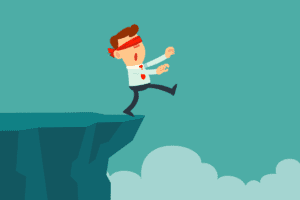Wait; what? We don’t like talking about failure. We may even hate it. And we are doing a disservice to our potential customers every single day by not talking about it.
Let me explain. In the StoryBrand framework I use with my clients, we have an element of our marketing content that includes failure. It is critical to my clients’ success and yours.
What failure content in marketing isn’t
When we talk about failure, we are not talking about calling our customers failures.
Never call your customer a failure. And never wish failure upon a potential customer that falls through.
What failure content in marketing is
Instead, we use failure to let the customer know what’s at stake and warn them about the risks involved with not doing business with you. When I introduce a client to this concept, they often question, “What do you mean risks?” Oh, there are many. Here are a few questions to help you zero in on the risks your customer is taking if they choose not to work with you.
What would happen if the customer doesn’t solve their problem at all? For example, a potential landscaping customer could be embarrassed by their lawn becoming an overgrown eyesore.
What would happen if the customer used your competitor? Would they pay too much? Would they get a sub-quality service? For example, a customer could save money by bypassing a local manufacturer, but what will they do if there’s a mistake with the order, or if there is a shipping delay or a language barrier?
What would happen if the customer tried to do it on their own? Have you ever walked into someone’s house and immediately knew their recent renovation was a DIY but shouldn’t have been? The paint may be blotchy, the molding not quite cut right, and everything is just somehow a little off. The same is probably true for your customers. You are a professional, and they are not.
How do you use it?
Don’t show pictures of your customers in prison. This sounds funny, but, believe it or not, I had a competitor who did this a lot! It was brutal.
I’m using this admittedly absurd (but real) example to show that failure should not be the centerpiece of your marketing. Your customers’ success is the centerpiece, and you should use failure as a contrast to highlight and reinforce the success available to those who do business with you. One practical way to do this is with failure: success pairings. Here’s an example: Your customers’ success is the centerpiece, and you should use failure as a contrast to highlight and reinforce the success available to those who do business with you.Your customers' success is the centerpiece, and you should use failure as a contrast to highlight and reinforce the success available to those who do business with you. Share on X
With ABC Security, you can stop worrying if your family is safe (failure) and enjoy every carefree moment with those you love most (success).
How do you use (or plan to use) a touch of failure in your marketing? Please post a comment below and let me know!





 Is Your Website Button Superman or Clark Kent?
Is Your Website Button Superman or Clark Kent?